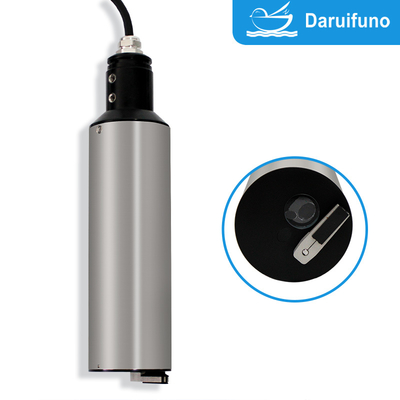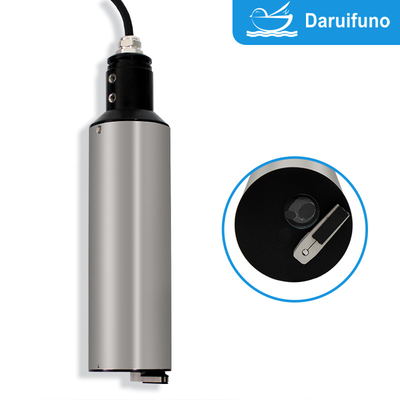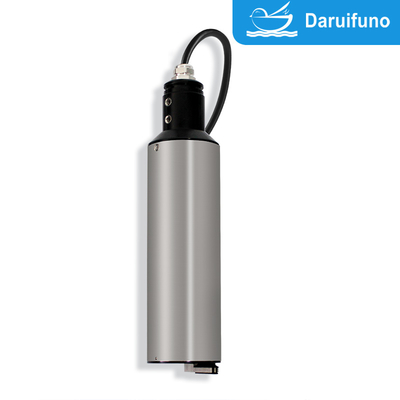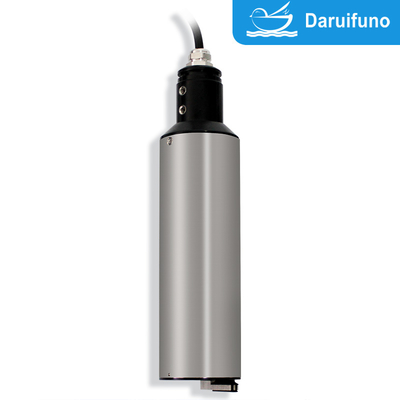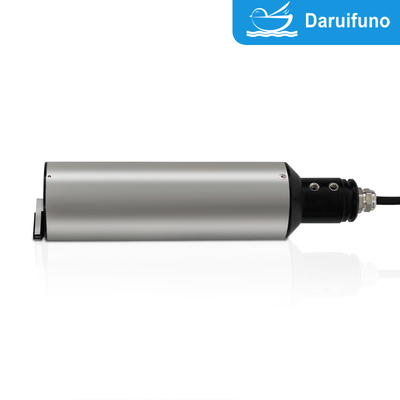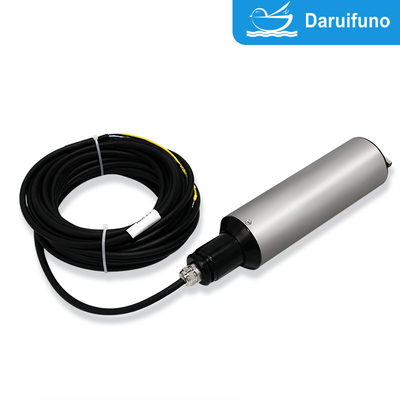High Accuracy Infrared Double Beam Tubidity Sensor For Sewage Treatment
The Daruifuno OPTU201 employs a sophisticated infrared absorption and scattering method to measure turbidity with high accuracy. The sensor uses a stable 860nm LED infrared light source to emit light into the water. As light passes through, suspended particles cause it to scatter. The sensor's detectors then measure both the scattered and absorbed light. By analyzing the ratio and intensity of this scattered light, the sensor precisely calculates the turbidity of the water. This advanced principle ensures stable data, reliable performance, and high-precision measurement, even in challenging conditions.

Technical Parameters
| Sensor Information |
Infrared Turbidity Sensor |
| Model |
OPTU311(with brush) |
| Measuring Technology |
Infrared scattering principle |
| Measuring Range |
0.01~4000NTU |
| Resolution |
0.01NTU |
| Accuracy |
Less than ± 2% of measured value or ± 0.1NTU, take the larger one
|
| Communication |
RS485 MODBUS-RTU |
| Response Time |
T90< 60s |
| Calibration Method |
Multi-point calibration; factor correction |
| Working Pressure |
≤4Bar |
| Sample Flow Rate |
No dependency |
| Cleaning Method |
Equipped with a cleaning brush, automatic cleaning under water |
| Working Temp. |
0~45°C (no freezing) |
| Storage Temp. |
0~60℃ (no freezing) |
| Main Material |
SUS 316L stainless steel (@Titanium customized) |
| Dimension |
Φ60mm*L265mm |
| Mounting |
Horizontal installation, (special installation accessories are required) |
| Lead Interface |
Integrated lead |
| Protection Grade |
IP68 |
| Power Supply |
9~24 V DC
|
| Power Consumption |
1.5W |
| Weight |
800g |
| Cable |
Standard 10 meters |
Features
- Reliable performance, simple installation and calibration
-
High-Precision Measurement: Utilizing an advanced 860nm LED infrared light source and the infrared absorption and scattering method, the sensor delivers exceptionally stable and accurate turbidity data.
-
Robust and Durable Design: Built with SS316L stainless steel and an IP68 waterproof rating, the OPTU201 is engineered to withstand harsh industrial and environmental conditions, ensuring a long operational life.
-
Self-Cleaning Functionality: The integrated self-cleaning brush automatically prevents fouling and biofouling on the optical surface, significantly reducing maintenance and ensuring continuous, reliable readings without manual intervention.
-
Excellent Anti-Interference Capability: With electrically isolated communication and power interfaces, the sensor effectively resists electromagnetic interference, guaranteeing stable and uninterrupted data transmission.
-
Seamless System Integration: The sensor supports the standard RS485 Modbus RTU protocol, allowing for easy and direct connection to industrial systems like PLCs, DTUs, and PCs.
-
Wide Application Range: Its versatile design and reliable performance make it suitable for a broad spectrum of applications, including wastewater treatment, waterworks, surface water monitoring, and various industrial processes.
The Daruifuno OPTU201 features an integrated self-cleaning brush that significantly reduces maintenance and ensures long-term accuracy. This innovative function automatically cleans the sensor's optical surface, preventing fouling and biofouling from interfering with measurements. By minimizing manual cleaning and recalibration, the self-cleaning brush provides continuous, reliable operation, making it ideal for unattended monitoring in harsh environments.
OPTU201 is equipped with an industry-standard RS485 Modbus RTU interface, ensuring reliable and robust communication. This widely adopted protocol allows for seamless integration into various industrial control systems. With its electrically isolated communication and power interfaces, the sensor effectively resists electromagnetic interference, guaranteeing stable and accurate data transmission. The Modbus RTU protocol enables easy connection to PLCs, DTUs, PCs, and other monitoring devices, making the OPTU201 a highly versatile and compatible solution for modern industrial automation.


Application environment:
Water quality monitoring: Infrared digital turbidity sensors can be used to monitor turbidity changes in water bodies such as tap water, surface water, rivers, lakes and reservoirs. In these environments, sensors help assess the cleanliness of water bodies and changes in water quality.
Sewage treatment: In sewage treatment plants, infrared digital turbidity sensors can be used to monitor the turbidity of sewage before and after treatment, help evaluate the treatment effect and determine whether further treatment steps are required to ensure that the treated water quality meets the discharge standards.
Aquaculture: In hydroponic and aquaculture farms, infrared digital turbidity sensors can help monitor suspended matter in water to maintain a suitable water quality environment and promote the growth and health of plants and animals.
Environmental monitoring: Infrared digital turbidity sensors can also be used in environmental monitoring projects, such as measuring water quality in rivers, lakes and oceans to monitor environmental changes and pollution conditions.
Waterworks (Tap Water Plants): It plays a key role in ensuring the safety of drinking water by continuously monitoring the turbidity levels throughout the purification process, from raw water intake to the final output.
Industrial Applications: It serves numerous industries that require precise turbidity control, such as food and beverage production, chemical processing, and aquaculture, helping to maintain product quality and operational efficiency.
Infrared digital turbidity sensors are widely used in various fields involving water turbidity and suspended solids concentration. They provide a convenient, efficient, and accurate measurement method that contributes to water safety, environmental monitoring, and quality control of industrial production processes.


 Your message must be between 20-3,000 characters!
Your message must be between 20-3,000 characters! Please check your E-mail!
Please check your E-mail!  Your message must be between 20-3,000 characters!
Your message must be between 20-3,000 characters! Please check your E-mail!
Please check your E-mail! 


